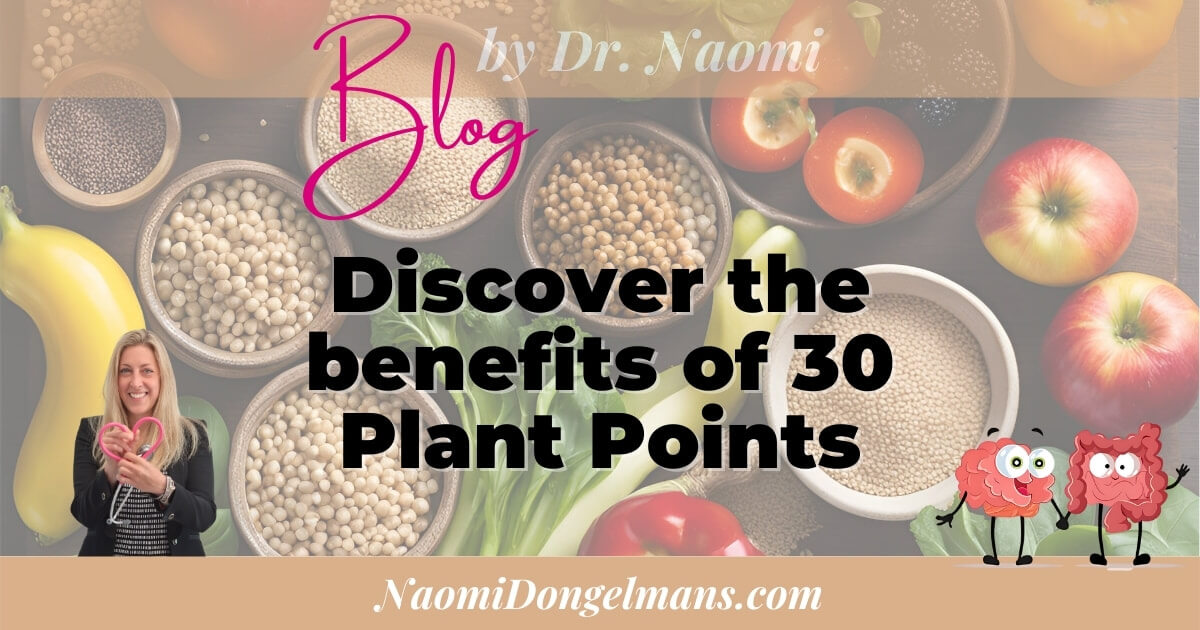
When it comes to nutrition, many of us are bombarded with advice about what to eat, how much to eat, and what’s good for our health. With so much information out there, it can be overwhelming to find a simple yet effective way to nourish our bodies. One approach that has gained traction is the 30 Plant Points guideline, which encourages you to consume a wide variety of plant-based foods weekly.
My journey into the world of diverse eating began during my time in Japan, where I had the incredible opportunity to stay with a professor who taught me about traditional Japanese cooking. Breakfast was always a colourful affair, starting with a wholesome bowl of miso soup featuring soft tofu, fresh herbs, and seaweed. Following that, I often enjoyed a light salad of lettuce and tomato topped with a perfectly fried egg. These meals were not just nutritious; they were a celebration of flavours, textures, and the importance of variety in our daily diets. This experience opened my eyes to the significance of including a broad spectrum of plant foods in our meals—a lesson that is at the heart of the 30 Plant Points concept.
So, what’s the deal with these Plant Points? Let’s dive in and discover how you can spice up your diet, improve your gut health, and enjoy the process!
Understanding Plant Points
What are Plant Points?
At its core, Plant Points refers to a system that encourages you to consume at least 30 different plant-based foods each week. But it isn’t just about hitting a number; it’s about embracing variety. Each unique plant food comes packed with distinct nutrients, flavours, and health benefits. Think of these points as treasure tokens for your body—each one you collect makes your health more vibrant!
Why focus on plant diversity?
Eating a diverse range of plants is crucial for several reasons. Variety not only helps us get a wide array of nutrients but also plays a significant role in nourishing our gut microbiome. A rich microbiome, filled with diverse bacteria, is linked to improved digestive health, reduced inflammation, and even mental clarity. So, why limit ourselves to the same handful of fruits and veggies when the world of plants is so vast?
Historical context
Traditional dietary patterns
If you look back through history, you'll find that many cultures thrived on diets that emphasized a broad range of plant foods. Whether it's the Mediterranean diet, rich in diverse grains, legumes, and greens, or traditional Japanese diets focusing on seasonal vegetables, these eating habits have recognized the benefits of variety for centuries.
Emergence of the 30 Plant Points concept
The 30 Plant Points concept draws inspiration from these traditional patterns and combines them with modern nutritional research. The idea is simple yet profound: by consuming a wide range of plants, we can empower ourselves to live healthier lives.

The key components of the 30 Plant Points
Types of plant foods included
To rack up your Plant Points, you should focus on:
- Fruits: Apples, bananas, berries, citrus fruits
- Vegetables: Spinach, carrots, bell peppers, broccoli
- Legumes: Lentils, chickpeas, beans, peas
- Nuts and seeds: Almonds, walnuts, chia seeds, sunflower seeds
- Whole grains: Quinoa, brown rice, oats, barley
- Herbs and spices: Basil, cilantro, turmeric, cinnamon
Each category offers unique nutrients and compounds that are beneficial for your health.
Daily & weekly goals
Aim for 30 different plants per week—about four to six different plant foods each day. This ensures you’re not just hitting a number, but also embracing variety in your meals.
Benefits of the 30 Plant Points
Enhancing gut health
Diversity in your diet significantly contributes to a healthy gut. Diverse plant foods introduce different types of fibres and phytochemicals that feed various beneficial bacteria. This results in improved digestion, enhanced immunity, and even mood regulation.
Nutritional benefits
Another appealing aspect of the Plant Points system is nutrition. A wide range of fruits and vegetables can help combat nutrient deficiencies, providing essential vitamins, minerals, and antioxidants. Think about how robust your body's defences become when you nourish it with a spectrum of colours!
Psychological well-being
Let’s not forget the joy of eating. A diverse diet makes meals exciting and aesthetically pleasing, which can enhance mindfulness and enjoyment. The simple act of putting together a colourful plate can boost your mood—after all, who doesn’t love a vibrant rainbow of veggies?
Drawbacks to consider
Potential challenges
Of course, starting something new can be daunting. For those accustomed to more structured eating patterns, embracing Plant Points may feel overwhelming at first. You might wonder, "Where do I even start?" It takes time to adjust, but remember to take it one meal at a time.
Managing dietary restrictions
If you have allergies or culinary limitations, adapting the 30 Plant Points can seem tricky. However, there are plenty of alternatives—just consult with a healthcare provider to tailor the approach to your needs!
Implementing the 30 Plant Points
Practical tactics for incorporation
Integrating the 30 Plant Points into your daily routine can be easier than you'd think. Start by planning meals that focus on including various plant foods. Smoothies are a fantastic way to sneak in multiple fruits and greens, while salads can boast a plethora of ingredients.

Cooking and preparation tips
Turn your kitchen into a plant-point paradise! Experiment with different cooking methods to maximize nutrient retention, like steaming veggies instead of boiling them. Discover quick recipes that pack in the plant diversity—before you know it, you’ll be reaching for that broccoli and spinach like it’s second nature!
Case studies
Successful Transformations
Many individuals who have adopted the 30 Plant Points approach report significant improvements in their overall health. From enhanced energy levels to clearer skin, the benefits can be both immediate and prolonged.
Community Initiatives
There are many community programs inspiring people to incorporate more plant diversity. These initiatives often include cooking classes, gardening projects, or plant-based eating challenges that make the journey fun and rewarding!
Future trends in plant-based eating
Growing interest in plant-based diets
The shift towards plant-based diets is rapidly gaining momentum. More people are recognising the significant health benefits of consuming primarily plant-based foods. I've always aimed to eat around 500 grams of vegetables daily, and it's encouraging to see many now acknowledging its advantages.
Innovations in food production
With growing interest comes innovation! We now see more plant foods available in stores and markets, making it easier to try new types in our meals. It's important to choose real, whole foods instead of processed ones with additives including inflammatory seed oils. These natural foods are better for your health. Also, aim to buy locally produced vegetables and fruits. For example, if you're in Europe, choose local apples instead of those from far away, like Chile. We have many delicious varieties right here!
Conclusion
The 30 Plant Points approach invites you to explore a rich variety of plant foods, transforming your diet and boosting your wellness. By embracing this diversity, you’re not just marking off points; you’re making a meaningful investment in your health, happiness, and gut microbiome. Even small changes, like trying new grains or experimenting with different spices, can have a significant impact. Remember, the journey is about enjoying the discovery of diverse flavours and benefits that nature has to offer—your body will thank you!
Printable Plant Points list
To help you get started on your journey toward achieving your 30 Plant Points each week, I’ve created a beautifully designed, printable list of fruits, vegetables, legumes, nuts and seeds, whole grains, and herbs. You can access this PDF by following the link below. Let’s make plant diversity a reality together!
FAQs
- What counts as a plant point? A plant point is assigned to each unique plant-based food you consume. For example, eating an apple, a carrot, and a handful of almonds would earn you three plant points.
- Can I include processed plant-based foods in my count? While it’s best to focus on whole, unprocessed plant foods, some minimally processed items like whole grain bread or canned beans can still contribute to your points.
- How can I effectively track my Plant Points? You can use meal planning apps, journals, or even simple spreadsheets to keep track of the different plant foods you consume throughout the week.
- What if I have dietary restrictions—how can I adapt this concept? You can adapt the 30 Plant Points by focusing on a variety of plants that fit your dietary needs. Consulting with a nutritionist can help tailor the approach to your specific requirements.
- Are there specific plant foods I should focus on more? Aim for a wide range of colours and types. Dark leafy greens, berries, legumes, and nuts are especially beneficial, but variety is key to comprehensive nutrient intake.
Embrace the joy of eating healthily with Plant Points! Your journey towards a more diverse diet awaits!
Ready to transform your health?
If you're looking for personalised guidance and support on your journey to better health, I'm here to help! Whether you need tailored meal plans, expert advice on nutrition, or strategies to boost your overall well-being, let's work together to achieve your goals.
Book a FREE call with me today!
Click here to schedule your free consultation. Let's discuss how we can make your healthy living journey successful and sustainable.
Stay healthy and happy!
Love what you read here? Subscribe for updates! Add me to the list!





![[VIDEO BLOG] What to do when your loved one wants to go to a deceased person?](https://getoiling-7611-fast.b-cdn.net/images/7611-635683946d10d.jpg)





















0 Comments